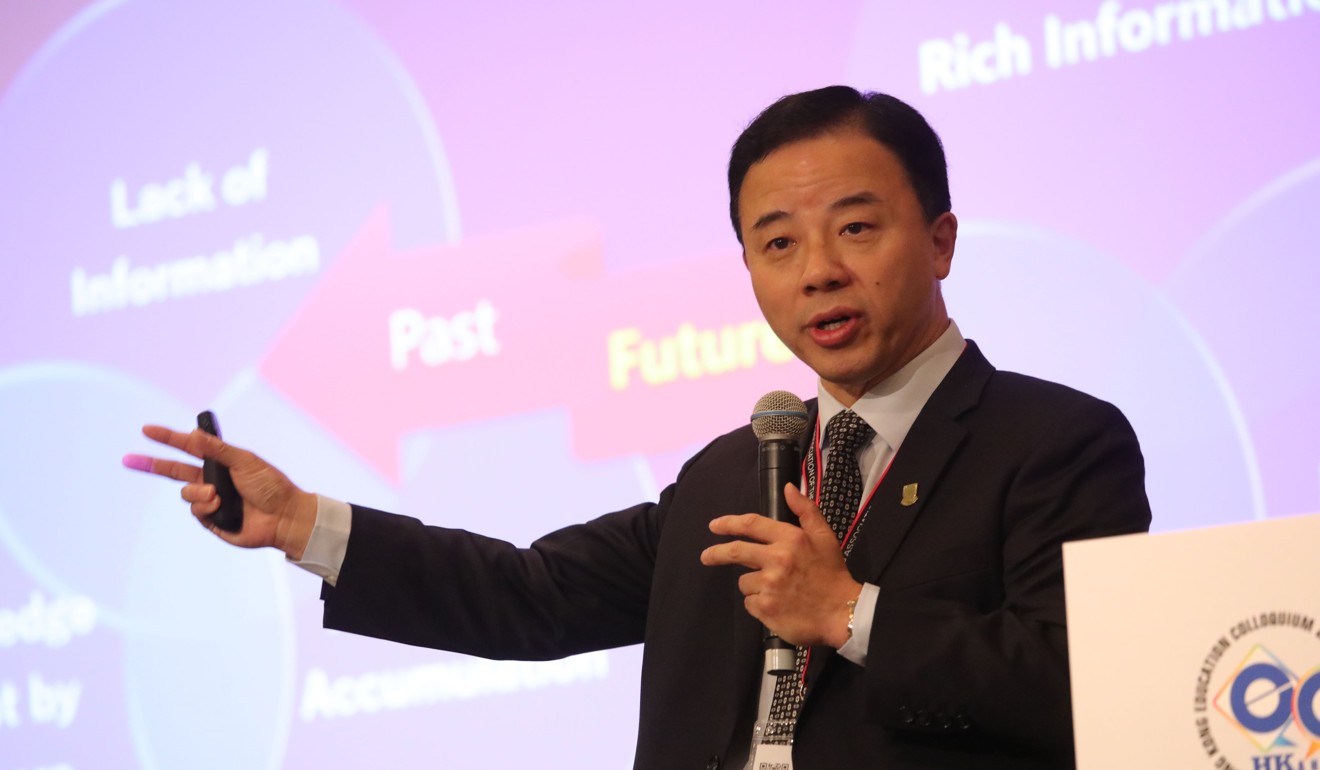
Hong Kong’s top judge urges students to embrace their community and act with ‘tolerance and respect’
- Chief Justice Geoffrey Ma makes comments at education symposium in speech ‘Today’s Students, Tomorrow’s Leaders’
Hong Kong’s Chief Justice Geoffrey Ma Tao-li has called on students to think “tolerance, respect and compromise” as they one day leave school to become future leaders in society.
The top judge’s speech, given at a secondary education symposium on Wednesday, was made against the backdrop of months of anti-government protests, which have resulted in the arrests of more than 300 high school students.
Ma also urged teachers to help their students develop a sense of belonging to the community.
“It is not controversial, we should all have a sense of community,” he said. “It should surely be one of the many objectives of education, which is to provide our students with the tools to be able to decide for themselves, and be convinced how vital it is to embrace this concept.”

While admitting he was no expert in education, Ma said he saw similarities between it and the law, which reflected the society’s fundamentals.
“If today’s students are to justify their roles to become tomorrow’s leaders, a sense of community rooted in the fundamentals of tolerance, respect and compromises are something they, and all of us, must process,” he said, in concluding his speech “Today’s Students, Tomorrow’s Leaders” at the Education Colloquium 2019.
The chief justice said Hong Kong had the Basic Law, its mini-constitution, and Bill of Rights, which guaranteed human rights and freedom, including among other rights, the right to stand for an election. The remark came just a day after pro-democracy activist and former student leader Joshua Wong Chi-fung was barred from running in the District Council elections, after a returning officer invalidated his candidacy on the grounds that he supported self-determination which could be interpreted as a form of independence.
Ma said rights should be interpreted generously. The city also had criminal and civil laws to protect the rights of others, he said.
“The difficulties arise when the purported exercise of rights and freedom is taken to the limits, and meets head on with the legitimate and reasonable interests or points of view which show the opposite direction,” he said.
After protest attacks, Hong Kong students learn self-defence at Chinese University
Ma said the judiciary’s job was to strike a balance. “There must be respect on not only individual rights, but also the rights of other people in society,” he said.
Speaking at the event, Anna Wu Hung-yuk, chairwoman of the Competition Commission, said she believed the younger members of Hong Kong society were very talented, but was saddened to read protest messages that implied they had no hope for the future.
The message, which had been stuck on a wall, read: “$7k for a house like a cell and you really think we out here [are] scared of jail?”
Wu, a former member of the government’s top advisory body, the Executive Council, said the crisis Hong Kong faced was a political one, and needed a political solution.

Ma opened the event, followed by a keynote speech from the University of Hong Kong’s vice-chancellor Zhang Xiang.
Zhang, who has been under pressure from his students and alumni to take a stance against what they claim has been police brutality during the protests, left without speaking to the press after giving a speech on innovation.
Secretary for Education Kevin Yeung Yung-hung was expected to deliver a closing speech on Wednesday afternoon, but organisers said his appearance was cancelled.
Since June, Hong Kong has been embroiled in waves of anti-government protests, sparked by the now-withdrawn extradition bill, which would have allowed for the transfer of fugitives to jurisdictions with which the city has no such agreement, including mainland China.
How do Hong Kong’s student protests compare with those worldwide?
The protests have since morphed into increasingly violent street confrontations with protesters vandalising metro stations and businesses they perceive as pro-China.
Police have fired tear gas and projectiles in return, but have been accused of using excessive force, including firing live rounds, which hit one secondary school student in the chest and another in the leg.
Meanwhile, 21 academics from Hong Kong’s six universities have been granted subsidies through an initiative set up by National Natural Science Foundation of China for top young scientists. Each of them received 1.3 million yuan (HK$1.4 million) to conduct research in Hong Kong.

